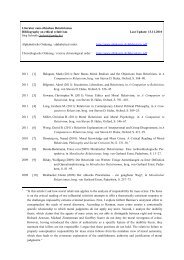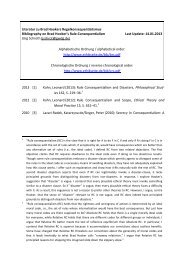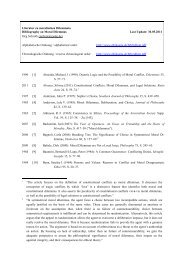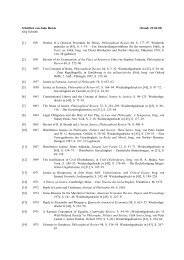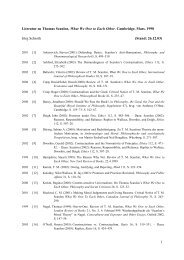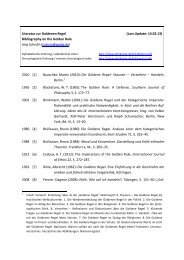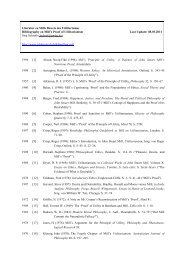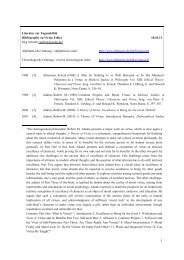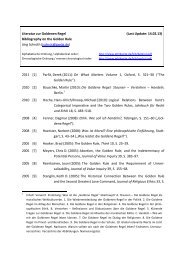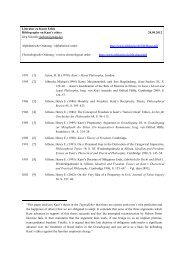Chronologische - Ethikseite
Chronologische - Ethikseite
Chronologische - Ethikseite
Create successful ePaper yourself
Turn your PDF publications into a flip-book with our unique Google optimized e-Paper software.
2011 [56] Stohr, Karen (2011): Kantian Beneficence and the Problem of Obligatory Aid, Journal of<br />
Moral Philosophy 8, S. 45–67. 22<br />
2011 [57] Swanton, Christine (2011): Kant’s Impartial Virtues of Love, in Perfecting Virtue. New Essays<br />
on Kantian Ethics and Virtue Ethics, hrsg. von Lawrence Jost und Julian Wuerth,<br />
Cambridge, S. 241–259.<br />
2011 [58] Walker, Mark Thomas (2011): Kant and Morality. Recovering the Categorical Imperative,<br />
Basingstoke.<br />
2011 [59] Wike, Victoria S. (2011): Defending Kant Against Nodding’s Care Ethics Critique, Kant<br />
Studies Online (Januar 2011), S. 1–26, http://www.kantstudiesonline.net.<br />
2011 [60] Wood, Allen W. (2011): Humanity as an End in Itself, in Derek Parfit, On What Matters<br />
Volume 2, Oxford, S. 58–82.<br />
2011 [61] Wood, Allen W. (2011): Kant and Agent-Oriented Ethics, in Perfecting Virtue. New Essays on<br />
Kantian Ethics and Virtue Ethics, hrsg. von Lawrence Jost und Julian Wuerth,<br />
Cambridge, S. 58–91.<br />
2011 [62] Wuerth, Julian (2011): Moving Beyond Kant’s Account of Agency in the Grounding, in<br />
Perfecting Virtue. New Essays on Kantian Ethics and Virtue Ethics, hrsg. von<br />
Lawrence Jost und Julian Wuerth, Cambridge, S. 147–63.<br />
2010 [63] Altman, Matthew C. (2010): Kant on Sex and Marriage: The Implications for the Same-Sex<br />
Marriage Debate, Kant-Studien 101, S. 309–30. 23<br />
2010 [64] Alves, Julius (2010): Vollkommene Tugendpflichten: Zur Systematik der Pflichten in Kants<br />
2) That a satisfactory response to maxim-fiddling can be articulated using Kantian resources, especially the<br />
first two formulations of the categorical imperative.<br />
This approach to maxim-fiddling draws our attention to a Kantian notion of an offence against Morality<br />
itself that has largely been overlooked.”<br />
22 “Common sense tells us that in certain circumstances, helping someone is morally obligatory. That intuition<br />
appears incompatible with Kant's account of beneficence as a wide imperfect duty, and its implication that<br />
agents may exercise latitude over which beneficent actions to perform. In this paper, I offer a resolution to<br />
the problem from which it follows that some opportunities to help admit latitude and others do not. I argue<br />
that beneficence has two components: the familiar wide duty to help others achieve their ends and a narrow<br />
duty to avoid indifference to others as end-setters. Although we are not always required to help, we are<br />
always required not to be indifferent. When helping someone is the only way not to be indifferent to a<br />
person, helping him/her is obligatory. My account avoids certain difficulties with other proposed solutions<br />
and can also address an important concern about proximity.”<br />
23 “When examined critically, Kant’s views on sex and marriage give us the tools to defend same-sex marriage<br />
on moral grounds. The sexual objectification of one’s partner can only be overcome when two people take<br />
responsibility for one another’s overall well-being, and this commitment is enforced through legal coercion.<br />
Kant’s views on the unnaturalness of homosexuality do not stand up to scrutiny, and he cannot (as he often<br />
tries to) restrict the purpose of sex to procreation. Kant himself rules out marriage only when the partners<br />
cannot give themselves to one another equally – that is, if there is inequality of exchange. Because same-sex<br />
marriage would be between equals and would allow homosexuals to express their desire in a morally<br />
appropriate way, it ought to be legalized.”



